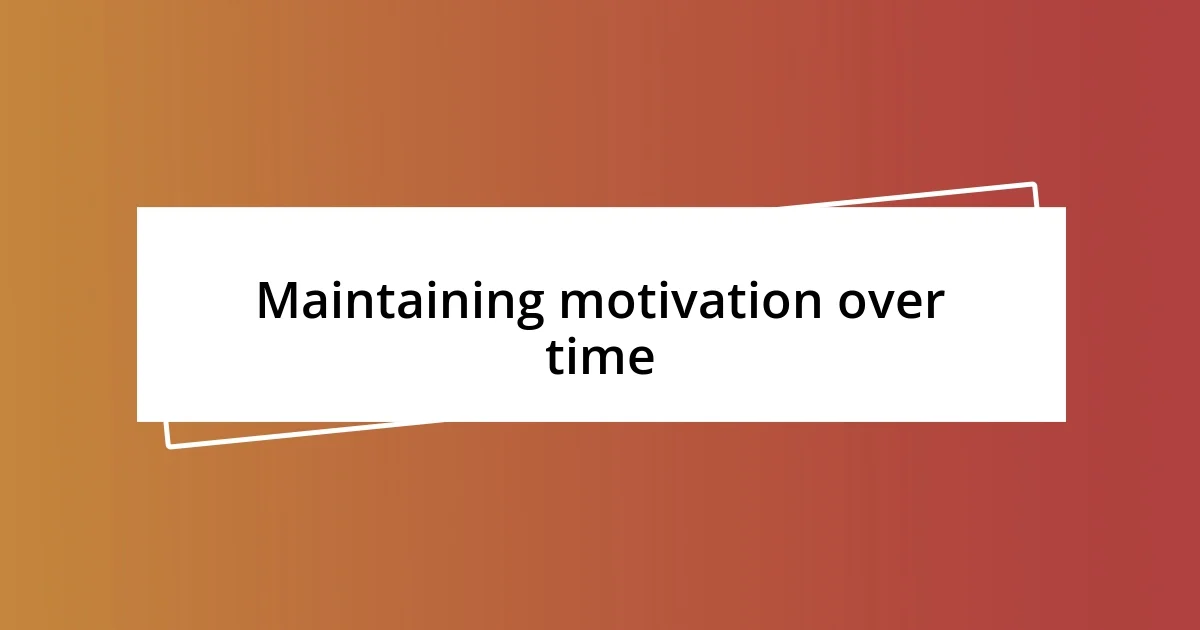Key takeaways:
- Establishing a consistent writing routine and identifying personal triggers can transform writing from a chore to a joyful practice.
- Setting achievable, specific, and measurable writing goals fosters progress and motivation, making the writing journey more fulfilling.
- Creating a conducive writing environment, celebrating small victories, and connecting with other writers can significantly enhance creativity and sustain motivation over time.

Understanding the writing habit
A writing habit isn’t just about putting pen to paper; it’s a routine shaped by intention and consistency. For me, setting aside time every day became a non-negotiable part of my schedule. Have you ever felt that rush of clarity when your thoughts spill onto the page? That’s the magic of a writing habit.
Initially, I struggled with writer’s block, often feeling overwhelmed by the blank page. But over time, I learned that embracing imperfection can unlock creativity. Isn’t it fascinating how, on days when I simply let the words flow without judgment, I often uncover ideas I never knew were there?
Understanding your triggers and motivators is crucial. For example, I find that writing in the early morning, with a fresh cup of coffee, provides me the energy and quiet I need to create. What about you? What conditions bring out your best writing? Identifying these nuances can transform your writing practice from a chore into a joy.

Establishing a writing routine
Establishing a writing routine is about finding a rhythm that resonates with you. When I created my writing schedule, I discovered that consistency was key. I decided to dedicate the first hour of my day to writing. Initially, it felt daunting, but as those days turned into weeks, I began to crave that quiet time with my thoughts.
Here’s what I found helpful in sticking to a routine:
– Choose a specific time each day to write.
– Create a dedicated writing space that minimizes distractions.
– Set achievable goals for each session, like word count or time spent.
– Keep a journal or log to track your progress and feelings about writing.
– Be flexible and allow yourself grace on tough days; remember, it’s a journey.
These small steps significantly upgraded my writing experience, allowing me to look forward to those moments each day. Trust me, once you settle into your routine, you’ll likely find that writing becomes a cherished part of your day, rather than a chore.

Setting achievable writing goals
Setting achievable writing goals is essential to developing a sustainable writing habit. Early in my journey, I often set my sights too high, wanting to write an entire chapter in one sitting. The disappointment of not reaching those lofty aspirations left me discouraged. Over time, I realized that breaking my goals into smaller, manageable tasks made a world of difference. For example, instead of aiming for a chapter, I now focus on writing just 300 words a day. That small shift not only feels less intimidating but also allows me to celebrate little victories more often.
Another key aspect of goal-setting is to make your goals specific and measurable. When I decided that I wanted to write three blog posts each month, I broke this down further into weekly targets. By setting aside time to brainstorm and outline my ideas, I found it was easier to stay on track. If you find yourself struggling to meet your goals, consider tweaking them to fit better within your lifestyle. Have you ever had to re-evaluate a goal because it felt too far out of reach? I certainly have. It’s perfectly okay to adjust as you grow.
Finally, don’t underestimate the power of accountability when it comes to your writing goals. I found that sharing my goals with a trusted friend made me feel more committed to following through. We check in on each other regularly, which motivates us to keep going even on our off days. Think about it: Who in your circle could help you stay accountable? Building a support network can amplify your efforts and make your writing journey far more enjoyable. Setting achievable goals is not just about numbers; it’s about creating a fulfilling writing experience.
| Goal Type | Description |
|---|---|
| Specific | Clearly define what you want to achieve, e.g., write 300 words daily. |
| Measurable | Include quantifiable metrics to track progress, like the number of blog posts per month. |
| Achievable | Ensure your goals are realistic based on your schedule, e.g., setting aside 15 minutes daily. |
| Relevant | Align your goals with your broader writing aspirations, such as building an online presence. |
| Time-Bound | Set deadlines for your goals to instill a sense of urgency, e.g., complete a draft by month-end. |

Creating a conducive writing environment
Creating a conducive writing environment is crucial for fostering creativity and maintaining focus. I’ve found that having a designated writing space can make all the difference. There was a time when I tried to write at the kitchen table while family chaos buzzed around me. It quickly became a lesson in distraction! Now, I’ve carved out a cozy nook in my home away from those interruptions, where I can immerse myself in my thoughts.
Lighting also plays a significant role in how I feel during my writing sessions. I usually favor natural light but, on gloomy days, I use soft lamp lighting instead. It creates a warm atmosphere that helps me relax and think clearly. Have you ever noticed how your mood shifts with different lighting? Creating a space that feels inviting and comfortable really enhances my creativity and willingness to write.
Finally, I’ve learned the importance of tidiness. Clutter can cloud my mind just as much as noise can distract me. I keep my writing area organized, which allows me to focus better on my words. I often pause to declutter my desk, and it surprises me how this simple act helps clear my head. What’s your routine like? I encourage you to experiment and find what setting inspires you most. Remember, the environment you create can either ignite your passion for writing or stifle it.

Overcoming writer’s block strategies
When writer’s block strikes, I often find that a simple change of scenery can work wonders. Just last week, I was staring at my blank screen, feeling utterly drained. I decided to step outside and take a walk around the park. The fresh air and nature’s beauty not only cleared my mind but sparked new ideas I hadn’t considered before. Have you ever realized how a shift in your environment can sometimes jumpstart your creativity? It’s like giving your brain a little nudge to wake up.
Another strategy I frequently employ is freewriting, where I put pen to paper (or fingers to keyboard) without worrying about grammar or coherence. I set a timer for 10 minutes and just let the words flow. This method takes the pressure off and often leads to unexpected insights. Recently, I wrote about a seemingly random memory that ended up becoming a central theme in my current piece. Have you tried this technique? It’s fascinating how freeing it can feel to write without constraints, allowing the real gems of inspiration to surface.
Finally, I’ve found that connecting with fellow writers can combat isolation and reignite motivation. Joining a local writing group was a game changer for me. We share our struggles, provide feedback, and cheer each other on. One day, after talking about our blocks over coffee, the conversation sparked ideas in each of us that turned into productive writing sessions. Have you ever felt that energy when collaborating with others? The supportive atmosphere often transforms my doubts into determination, making it easier to push through those stagnant moments.

Tracking progress and adjustments
Tracking my writing progress is a game changer. I keep a simple journal, noting daily word counts and reflections on what worked and what didn’t. This method not only makes me feel accountable but also allows me to see how my writing evolves over time. Have you ever considered how just logging these tiny victories can bolster your determination?
I also embrace flexibility in my writing routine. If I notice my output dwindling, I take a step back to analyze why. One particular week, I felt overwhelmed by outside commitments, and my writing suffered. Instead of pushing through in frustration, I adjusted my schedule, carving out specific times to focus on writing, and suddenly everything clicked again. It really taught me that sometimes, progress means recognizing when to adapt rather than forcing a system that isn’t working.
Regularly revisiting my goals keeps me grounded. I set short-term targets—like completing a certain number of pages—while keeping my eyes on the bigger picture. Last month, I aimed to improve my dialogue skills, so I analyzed chapters from my favorite novels. This blending of goals not only fuels my passion but reminds me to celebrate all forms of progress. When did you last reassess your goals? Reflecting on these points can truly enhance your writing journey.

Maintaining motivation over time
Maintaining motivation over time can be tricky, but I’ve discovered that the key lies in celebrating even the smallest achievements. Each time I hit a milestone, whether it’s finishing a paragraph or completing a chapter, I treat myself to something special—a favorite snack or a few minutes of my favorite show. Have you ever noticed how rewarding these little celebrations can boost your enthusiasm? It’s like giving yourself a high-five, reinforcing that every step counts.
I also find that revisiting my initial inspirations is vital. On days when my motivation dips, I pull out the journal where I first scribbled down my writing dreams and reasons for wanting to write. There’s something powerful about reconnecting with that raw excitement. Recently, I flipped through those pages and felt a spark reignite as I read my own words. Have you ever revisited your early motivations? It’s a great way to remind yourself why you started this journey.
Moreover, setting up a routine that feels less like a chore and more like a daily joy has kept me engaged. For instance, I’ve started incorporating writing into my morning routine, sipping coffee while jotting down ideas—it’s become my peaceful time. On particularly busy days, simply knowing that I have that space to create lifts my spirits. Have you thought about how a comforting routine could anchor your writing practice? It’s amazing how such rhythms can transform obligation into inspiration.














